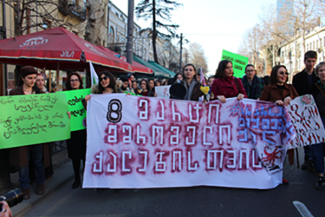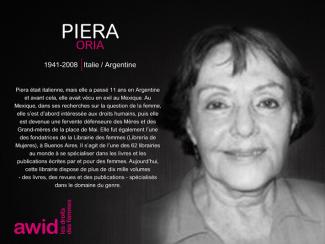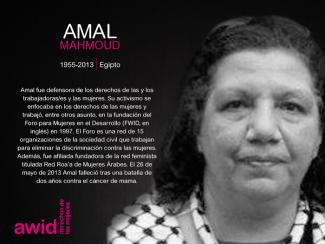El tema del 14° Foro Internacional de AWID es Realidades feministas: nuestro poder en acción
Queremos que hagan de este Foro su realidad feminista: un lugar donde puedan habitar un mundo diferente, al que traigan sus victorias, las soluciones que han creado, lo que lxs hace más fuertes, les da esperanza y les permite seguir adelante. Será una reunión diferente de otras a las que hayan asistido antes.
Lxs invitamos a sumarse a nosotrxs para crear juntxs este mundo. Valdrá la pena hacerlo.
Cada Foro tiene un tema que refleja las necesidades de nuestra membresía y movimientos, y que responde a cómo analizamos el contexto del momento.
El contexto global
Hoy en día los fascismos, fundamentalismos, autoritarismos y el poder empresarial sin restricciones están cobrando cada vez más impulso en el mundo. Vemos cómo estas amenazas convergen con los estados para determinar normas, narrativas y políticas públicas, haciendo que se arraigue una cultura de miedo, odio e incitación a la violencia en el discurso público. Los estados en quienes centrábamos nuestra incidencia y nuestras demandas de derechos, muchas veces ya no se sienten responsables y a veces ni siquiera cuentan con el poder necesario para afirmar derechos.
En estos tiempos inestables, complejos e inciertos necesitamos creatividad para organizarnos entre movimientos, coherencia para demandar y osadía para proponer.
De futuros feministas a realidades feministas
El Foro AWID 2016 estuvo centrado en los Futuros Feministas y en las condiciones necesarias para hacerlos realidad. En ese momento nos resultó claro que para muchos movimientos por la justicia social pensar soluciones estructurales por fuera del sistema actual constituía un verdadero desafío. Una larga experiencia de desigualdad y opresión puede limitar las posibilidades de la imaginación. Pero lo que también escuchamos en aquel momento y continuamos viendo a nuestro alrededor es que los movimientos feministas ya están viviendo y promoviendo realidades y soluciones centradas en los derechos y la justicia a todos los niveles.
Percibimos la urgencia de movilizarnos desde la esperanza y no en búsqueda de un mínimo común denominador - desde una esperanza apoyada en la certeza de que en todo el mundo, aun con sus imperfecciones, hay experiencias y prácticas que personifican formas más justas de existir y que compartiéndolas, fortaleciéndolas y profundizándolas podemos lograr que alcancen una mayor influencia.
No son sueños imposibles sino realidades que ya estamos viviendo. Esta sensación de posibilidad es una chispa que nos lleva a revisar y volver a valorar las dimensiones transformadoras del trabajo que hacemos.
Algunos ejemplos de realidades feministas en todo el mundo
En AWID entendemos las realidades feministas como ejemplos vivientes de los mundos que sabemos que son posibles. Para nosotrxs, estas realidades feministas proclaman y personifican la esperanza y el poder. Las encontramos en todo lo que nos muestra que existen otras formas de vivir, de pensar y de hacer, desde las expresiones cotidianas que se evidencian en cómo nos relacionamos con otrxs hasta los sistemas alternativos de gobernanza y de justicia. Las realidades feministas son formas de resistencia a sistemas de poder como el patriarcado, el capitalismo y la supremacía blanca.
Son propuestas poderosas que nos orientan hacia la idea de lo que es posible y nos muestran cómo los procesos de organización feminista están abriendo caminos hacia la justicia en movimientos y comunidades de todo el mundo.
-
En una comunidad negra profundamente marginada de Jackson, Mississippi, Cooperation Jackson lleva adelante un experimento de solidaridad y economía cooperativa. Es un plan ambicioso para desarrollar la propiedad comunitaria por fuera de los modos de producción capitalistas
-
En África Occidental, mujeres campesinas se están resistiendo a la apropiación de tierras y se niegan a aceptar proyectos de industrialización agrícola, afirmando con orgullo que Nosotras Somos la Solución en una campaña que desarrolla soluciones agroecológicas desde las campesinas y sus conocimientos para alimentar a las comunidades y mitigar el cambio climático
-
En la India, 5000 mujeres se han unido para desarrollar sistemas de soberanía alimentaria desde las comunidades, basados en los conocimientos locales y que incluyen bancos de cereales y semillas
-
En México, hay mujeres que han creado un sistema económico sin dinero. En El Cambalache todo tiene el mismo valor: las personas intercambian lo que ya no necesitan por objetos que quieren pero también por conocimientos, habilidades y ayuda mutua. El Cambalache está pensado desde los valores antisistema y anticapitalistas de los movimientos sociales locales
-
En Rojava, el pueblo kurdo está construyendo una democracia sin estado y las mujeres kurdas ofrecen la Ginología como marco de referencia para cuestionar el patriarcado, el capitalismo y el estado, creando sistemas e instituciones para ponerlo en práctica
-
En el Reino Unido, las Tías de la Agonía Anarca ofrecen un espectáculo con consejos sobre sexo y citas desde una perspectiva feminista, antifascista y anarquista. Rowan y Marijam están recuperando espacios ganados por la derecha ofreciéndole a un público sobre todo masculino la posibilidad de hacer preguntas difíciles sin ser juzgadxs
-
El Proyecto Veredictos Africanos Feministas redacta y difunde fallos alternativos en casos africanos decisivos sobre una variedad de temas. Este proyecto nace de una práctica jurídica feminista y propositiva para generar veredictos alternativos y feministas como aporte a la jurisprudencia, la práctica jurídica y la toma de decisiones judiciales de la región.
-
La Cooperativa Usha, también en India, se creó cuando los bancos tradicionales se negaban a atender a las trabajadoras sexuales en Sonagachi. Ellas se organizaron para crear su propia institución financiera que sirviera a sus intereses. La Cooperativa Usha es un banco cooperativo con más de 20 000 trabajadoras sexuales como socias que en solo un año dio préstamos a 7231 trabajadoras sexuales por valor de USD 4.7 millones. Todas las socias son trabajadoras sexuales. Verdaderamente les pertenece a ellas que son quienes toman decisiones sobre la gestión y dirección de la cooperativa, en un ejemplo pionero de cómo personas y comunidades marginalizadas pueden construir poder econòmico en sus propios términos.
-
En Puerto Rico, un fideicomiso sobre terrenos comunitarios está transformando un asentamiento en un canal contaminado e inundable en una comunidad sostenible. Constituye un nuevo modelo para urbanizar asentamientos sin que se tornen imposible seguir viviendo allí para sus residentes originales.
-
En muchos países latinoamericanos hay activistas que ofrecen asesoramiento y acompañamiento entre pares para la realización de abortos con pastillas, reivindicando el derecho de las personas gestantes a decidir sobre sus cuerpos y también al conocimiento médico (por razones de seguridad no incluimos vínculos)
El 14º Foro internacional de AWID
El Foro AWID estará organizado en torno a 6 ejes temáticos.
- Recursos para comunidades, movimientos y justicia económica
- Gobernanza, rendición de cuentas y justicia
- Realidades digitales
- Cuerpos, placer y bienestar
- El planeta y los seres vivientes
- Cómo nos organizamos lxs feministas
Más sobre estos ejes temáticos
Esperamos que el Foro 2020:
-
Acentúe el poder de las Realidades Feministas, nombrando, celebrando, difundiendo y entusiasmando con experiencias y propuestas que muestran lo que es posible que ocurra y nutren nuestra imaginación colectiva
-
Llene nuestros reservorios de esperanza y energía que son tan necesarios para el activismo y la resiliencia por los derechos y la justicia
-
Fortalezca los vínculos, la reciprocidad y la solidaridad entre los diversos movimientos feministas y con otros movimientos por los derechos y la justicia.
El Foro es un proceso colaborativo
El Foro es más que una reunión de cuatro días. Es una estación en un recorrido más largo para fortalecer nuestros movimientos en torno a la noción de Realidades Feministas que ya ha comenzado y que continuará más allá de las fechas del Foro.
Únete al Viaje










